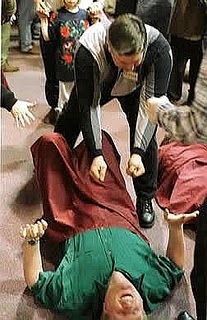I think we need to talk to each other about our spiritual lives. Even though we may respectfully disagree, I believe that peaceful co-existence of all religions in the 21st century depends on this.
|
To this end I interview various believers and non-believers here on Spritzophrenia. Today Romy Shiller from Montreal shares about her life and beliefs. Dr Shiller earned her PhD in drama, has published several books and works as a pop culture critic and writer. Her website is http://www.romyshiller.com
Jonathan: Hi Romy. Tell me a bit about your background- did you have any kind of spiritual upbringing?
Romy: Hey, Jon. Hmmm. I went to Hebrew School from grades 2-6. Took Hebrew in CEJEP for one semester, which comes after high school in Canada. Hebrew isn’t a religion but it’s certainly a part of my Jewish-ness. I can read, speak and write in Hebrew. When I light the candles for Shabbat or holidays a prayer in Hebrew is recited. I like that I know what I’m saying.
In grade 3, I won my first book prize for a poem I wrote about the Holocaust. My grandmother used to tell me stories about how her whole family was killed by Nazis for being Jewish in the Warsaw Ghetto in Poland.
|

Romy.
|
We were not spiritual (do you mean religious?) per se but we did celebrate the high holidays. We’d have a dinner and go to Shul (Synagogue). There, I always focused on good energy– not religion.
My Hebrew School was Kosher and followed all of the holidays– very different from home-life. I am vegetarian but I would never have milk with meat. That stayed from grade-school.
Jonathan: How would you describe your spiritual path now? How did you come to believe what you do?
Romy: I always say that I’m Jewish but I’m redefining what that means. As usual for me, Judaism is a base-line, and I freely extrapolate. I like my Jewish traditions and will always honour my grandparents.
I say that I’d be burnt in the ovens or stake as a witch no matter what I believe. As a matter of fact, just doing this interview is dangerous (But EXTREMELY important). Anti-Semitism is rampant. If you don’t hear from me in the future it’s your fault. 😉
On Twitter, someone using a Hitler icon recently threatened me. I will not give this person power by responding. I live with the danger of being a Jew every day.
So, no regular God for me. I have done psychic readings and Tarot cards, I have many different Tarot decks. One is Kabalistic and uses Hebrew letters. I believe in entities and one God. I believe in reincarnation. I have no friggin’ idea why I believe what I do. I have a blog on my metaphysical journey
Jonathan: What’s your day to day life like? Do you pray or keep Sabbath?
Romy: My day to day life has nothing to do with spirituality except that on the weekend I do Tarot. This to me is like a big fortune-cookie that I believe. My praying is more like thanking the powers that be. I am always grateful for ANY guidance. I kind of feel blessed.
I do not do Shabbat any more every Friday night but once in awhile. Again, it’s not religion for me, it is tradition. Lighting candles is like magic or meditation to me.
I just want to say something. At one time you talked with me about being Jewish not only as a religion but an ethnicity. If one buys into an idea of a straight, white, Christian, male as a ‘norm’ than I am ethnic. I have NEVER felt ethnic in any way. Even though there might be an impulse to label me as ‘exotic’ and although I might like that label, I am not that either. I am not an ethnic/exotic ‘other’.
Jonathan: When I said Judaism was an ethnicity as well as a religion, I meant no disrespect. ALL people have an ethnicity, including my own white New Zealand culture. It seems to me that Jewishness is a mixture of a “nation”, or “tribe” if you like, and a religion. Other religions, like Buddhism, seem to be uninterested in which tribe one comes from. Yet Judaism seems, to this outsider, very linked to a particular group. Any thoughts?
Romy: No offense taken? Jon. I don’t think that most people regard white, Christian, New Zealanders as ethnic. I don’t think anyone cares about my ‘tribe.’
I’m going to be very ‘in your face’ now. Nazis had this notion of ‘ethnic cleansing’ and moved towards a concept of an ‘Aryan Race.’ It brought that up for me.
Jonathan: You seem to have what might be called a “liberal” Jewish faith. (I don’t want to label you, so please forgive me if that doesn’t describe you.) How do you think about or relate to Orthodox or Hasidic Jews? In your point of view, is there any such thing as a “true” Jew these days, religiously?
Romy: Call me what you want but I may seep out of your definitions. Frustrating, eh?
I know a Christian, Filipino woman who works for Orthodox Jews. She will often remind me that it’s such-and-such Jewish holiday. I tell her that she’s a better Jew than me. *smile*
Orthodox and Hasidic Jews are extremely strict and play by the official Jew rules. They definitely embody qualities pertaining to being a “true” Jew. Nothing is ‘authentic’ but there are closer proximities than others.
Jonathan: I’m saddened that in modern Canada you still feel cautious about expressing your Jewishness. How do you think persecution has helped define you? (Persecution of your ancestors or in your own life?)
Romy: Yeah, it’s sad but not surprising. When I lived in Toronto, I brought in my grandparents to be interviewed about their Holocaust experience for the Shoah project by Steven Spielberg. There are Holocaust deniers and I thought that having a testimonial was important. [The Nazi Holocaust 1938-1945. Estimated Death Toll: 6 million Jews, 5 million others including 500,000 Gypsies, 6 million Poles, 5,000 to 15,000 homosexuals]
I was called a 3rd wave feminist in a book by the head of woman’s studies at South Carolina University. I researched what it meant to be a 3rd wave feminist. I found out that it’s aligned with a survivor mentality. I align myself with my grandparents whom I consider survivors. Persecution enabled this definition.
Jonathan: You seem to make a strong distinction between “religion” and “spirituality”. Can you tell me more about that?
Romy: Oh, yes I do make a huge distinction. Religion is paradigmatic. I consider it man-made, story-ridden and obviously ideological and prescriptive.
I am very spiritual. My spirituality is about connecting to unseen energies. It has nothing to do with prescriptions for being.
Jonathan: How does traditional Judaism think about spirituality outside the faith, eg Tarot? If the opinion is negative, does this bother you?
Romy: To be honest, Judaism in general doesn’t reflect upon Tarot and I don’t care what anyone thinks about my spirituality. I never did. I say, “bring it on.”
Jonathan: You said “no regular God for me” but also that you “believe in entities and one God”. What are these entities and God like for you?
Romy: Entities are like people who have passed on. Non-material beings that I can connect with. I find material physicality contentious.
I think of God as a quantum physics wave (or particle) in space. I am very comfortable with dualities. I don’t try to make things ‘fit.’ Ever.
The God thing is complex, eh? I absolutely do not believe that God created the Universe and even the idea of a ‘mind’ is problematic. My God doesn’t approximate human identity.
Jonathan: (This is the question I ask everyone.) Is truth important to you? If so, how do you know what you believe is true?
Truth is very important to me but I’m talking about honesty. In most of my books I use this example: Data and historical events do not shift but meaning does. The way we interpret data or historical events can change. For example, History. Things happened on certain dates. The way we regard these events might change. Data: Pluto is not considered a planet anymore. Alteration and flux are truth.
We are limited in what we can know given our senses. I know that any perspective I have is skewed. I am limited by my physicality– ironic because I am disabled.
A fish in a fishbowl only knows what a fish in a fishbowl knows.
Jonathan: Thanks for agreeing to be interviewed, Romy 🙂
Romy: A great pleasure Jon.
What questions would you ask Romy? If we’re lucky, she might respond.
Please subscribe (top left) 🙂
You can find other interviews here.









